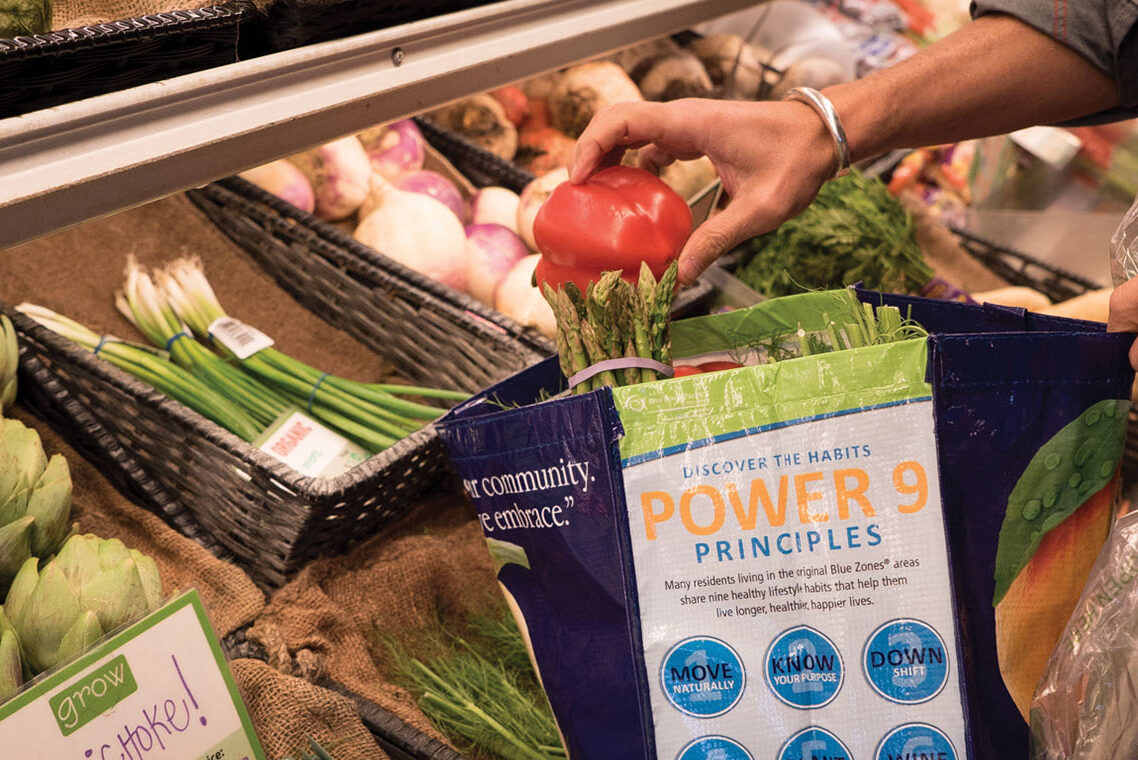Power 9 Principles

Many residents living in the original Blue Zones® areas share nine healthy lifestyle habits that help them live longer, healthier lives.
1. Move Naturally
The world’s longest-lived people don’t pump iron, run marathons or join gyms. Instead, they live in environments that constantly nudge them into moving without thinking about it. They live in places where they can walk to the store, to their friend’s house or places of worship. Their houses have stairs. They have gardens in their yards.
To start moving naturally, consider making things a little inconvenient. Take that extra trip up or down the stairs instead of loading things at the top or bottom to take up later. Walk to your airport gate instead of taking the moving walkway or park far from the entrance when you visit a store. Walk a dog, do your own yard and housework, and get rid of some of the timesaving electronics and power equipment that have “simplified” your life.
2. Know Your Purpose
The Okinawans call it “Ikigai” and the Nicoyans call it “plan de vida;” For both, it translates to “why I wake up in the morning.” Having a purpose is linked with health and longevity, with studies showing that individuals who expressed a clear goal in life live longer than those who did not.
Begin investigating your own purpose by creating an internal inventory of your life. Try to articulate your values, passions, gifts and talents. What are the things you like to do and the things you don’t? Then incorporate ways to put your skills into action in ways that will add meaning to your life and the lives of others.
3. Down Shift
Stress leads to chronic inflammation, which is associated with every major age-related disease. Although everyone experiences stress, the world’s longest-lived people have routines to shed that stress. Okinawans take a few moments each day to remember their ancestors, Adventists pray, Ikarians take a nap and Sardinians do happy hour.
You, too, can find a stress-relieving strategy that works for you and make it a routine. You’ll be able to benefit both physically and emotionally!
4. 80% Rule
Marketers tell us we can eat our way to health, but America has been eating its way well beyond health. The 80% Rule is a strategy that focuses on taking things out of everyday diets, instead of putting more things in.
Saying “Hara hachi bu,” the 2500-year old Confucian mantra, before meals, reminds Okinawans to stop eating when their stomach is 80% full. This 20% gap between not being hungry and feeling full could be the difference between losing weight or gaining it.
You can also replace your big tableware with 10″ plates and tall, skinny glasses, remove any TVs from the kitchen, and remember that people in the Blue Zones areas eat their smallest meal in the late afternoon or early evening and then don’t eat any more the rest of the day.
5. Plant Slant
While most people in the Blue Zones areas only consume small amounts of meat on rare occasions, all of them eat a rich array of fresh fruits and vegetables, which are packed with disease-fighting nutrients. The cornerstone of most centenarian diets is beans, favorites including fava, black, soy and lentils.
You can eat meat if you want to, but try considering it as a condiment and make sure you buy the leanest, finest meat you can afford. Limit portions to the size of a deck of cards and don’t serve it more than twice a week. This is consistent with the USDA’s MyPlate recommendations to make fruits, vegetables and grains the majority of your intake. You can also focus on eating nuts — a handful a day can give you an extra 2-3 years of life expectancy!
6. Friends @ Five
Spark more happiness by sharing your day with others. Whether you sit down together for a meal or meet up for a cup of tea or coffee, the benefits of a daily connection with friends and family come from ending work at a reasonable hour and enjoying a daily de-stressor and social time. Research has shown this practice to be one trait of people living measurably better, longer lives in areas around the world called Blue Zones.
7. Positive Pack
The world’s longest-lived people are either born into or choose to create social circles that support healthy behaviors. Ikarians enjoy tight-knit communities that socialize frequently, while Okinawans build “moai” groups of five friends that commit to each other for life.
Research from the Framingham Studies shows that smoking, obesity, happiness and even loneliness are contagious. Assessing who you hang out with and then proactively surrounding yourself with the right friends will do more to add years to your life than just about anything else.
8. Belong
All but five of the 263 centenarians interviewed in the original Blue Zones areas studies belonged to some faith-based community. Belong to a civic- or faith-based organization, since strong social relationships can add years to your life.
If you already belong to a group, great! If it’s been a while or you aren’t sure where to start, try asking friends and neighbors for their suggestions or searching for additional information online.
9. Loved Ones First
Happy, healthy centenarians in the Blue Zones areas put their families first. This can take shape in many ways, from keeping your aging parents and grandparents in or near your home to being in a positive, committed relationship, which can add up to six years of life expectancy.
Caring for children is important for many reasons, too, and many people in the Blue Zones areas go out of their way to invest time and love their children to ensure they’ll be more likely to care for them when the time comes.
Copyright © 2021 Blue Zones, LLC and Sharecare, Inc. All rights reserved.
You May Also Like

Stay Connected
Sign up to get interesting news and updates delivered to your inbox.



